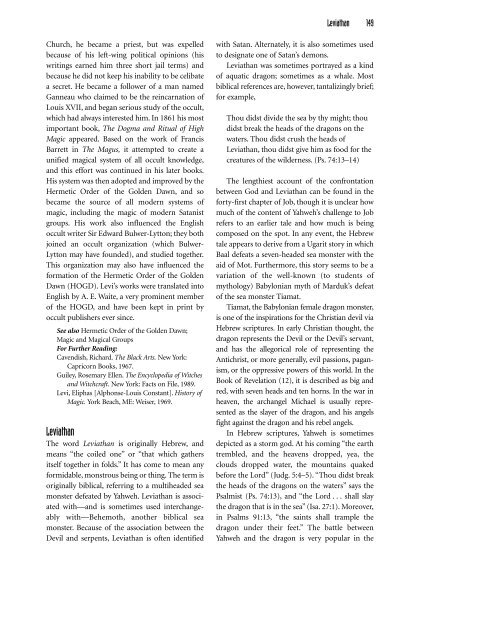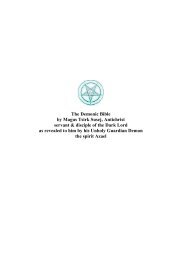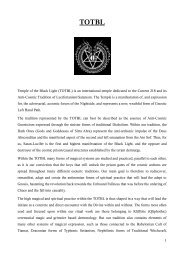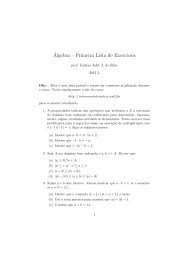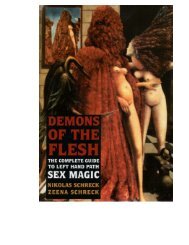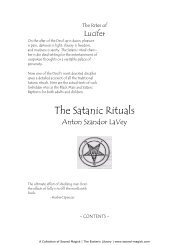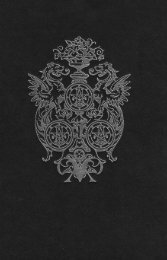Satanism Today - An Encyclopedia of Religion, Folklore and Popular ...
Satanism Today - An Encyclopedia of Religion, Folklore and Popular ...
Satanism Today - An Encyclopedia of Religion, Folklore and Popular ...
You also want an ePaper? Increase the reach of your titles
YUMPU automatically turns print PDFs into web optimized ePapers that Google loves.
Leviathan 149<br />
Church, he became a priest, but was expelled<br />
because <strong>of</strong> his left-wing political opinions (his<br />
writings earned him three short jail terms) <strong>and</strong><br />
because he did not keep his inability to be celibate<br />
a secret. He became a follower <strong>of</strong> a man named<br />
Ganneau who claimed to be the reincarnation <strong>of</strong><br />
Louis XVII, <strong>and</strong> began serious study <strong>of</strong> the occult,<br />
which had always interested him. In 1861 his most<br />
important book, The Dogma <strong>and</strong> Ritual <strong>of</strong> High<br />
Magic appeared. Based on the work <strong>of</strong> Francis<br />
Barrett in The Magus, it attempted to create a<br />
unified magical system <strong>of</strong> all occult knowledge,<br />
<strong>and</strong> this effort was continued in his later books.<br />
His system was then adopted <strong>and</strong> improved by the<br />
Hermetic Order <strong>of</strong> the Golden Dawn, <strong>and</strong> so<br />
became the source <strong>of</strong> all modern systems <strong>of</strong><br />
magic, including the magic <strong>of</strong> modern Satanist<br />
groups. His work also influenced the English<br />
occult writer Sir Edward Bulwer-Lytton; they both<br />
joined an occult organization (which Bulwer-<br />
Lytton may have founded), <strong>and</strong> studied together.<br />
This organization may also have influenced the<br />
formation <strong>of</strong> the Hermetic Order <strong>of</strong> the Golden<br />
Dawn (HOGD). Levi’s works were translated into<br />
English by A. E. Waite, a very prominent member<br />
<strong>of</strong> the HOGD, <strong>and</strong> have been kept in print by<br />
occult publishers ever since.<br />
See also Hermetic Order <strong>of</strong> the Golden Dawn;<br />
Magic <strong>and</strong> Magical Groups<br />
For Further Reading:<br />
Cavendish, Richard. The Black Arts. New York:<br />
Capricorn Books, 1967.<br />
Guiley, Rosemary Ellen. The <strong>Encyclopedia</strong> <strong>of</strong> Witches<br />
<strong>and</strong> Witchcraft. New York: Facts on File, 1989.<br />
Levi, Eliphas [Alphonse-Louis Constant]. History <strong>of</strong><br />
Magic. York Beach, ME: Weiser, 1969.<br />
Leviathan<br />
The word Leviathan is originally Hebrew, <strong>and</strong><br />
means “the coiled one” or “that which gathers<br />
itself together in folds.” It has come to mean any<br />
formidable, monstrous being or thing. The term is<br />
originally biblical, referring to a multiheaded sea<br />
monster defeated by Yahweh. Leviathan is associated<br />
with—<strong>and</strong> is sometimes used interchangeably<br />
with—Behemoth, another biblical sea<br />
monster. Because <strong>of</strong> the association between the<br />
Devil <strong>and</strong> serpents, Leviathan is <strong>of</strong>ten identified<br />
with Satan. Alternately, it is also sometimes used<br />
to designate one <strong>of</strong> Satan’s demons.<br />
Leviathan was sometimes portrayed as a kind<br />
<strong>of</strong> aquatic dragon; sometimes as a whale. Most<br />
biblical references are, however, tantalizingly brief;<br />
for example,<br />
Thou didst divide the sea by thy might; thou<br />
didst break the heads <strong>of</strong> the dragons on the<br />
waters. Thou didst crush the heads <strong>of</strong><br />
Leviathan, thou didst give him as food for the<br />
creatures <strong>of</strong> the wilderness. (Ps. 74:13–14)<br />
The lengthiest account <strong>of</strong> the confrontation<br />
between God <strong>and</strong> Leviathan can be found in the<br />
forty-first chapter <strong>of</strong> Job, though it is unclear how<br />
much <strong>of</strong> the content <strong>of</strong> Yahweh’s challenge to Job<br />
refers to an earlier tale <strong>and</strong> how much is being<br />
composed on the spot. In any event, the Hebrew<br />
tale appears to derive from a Ugarit story in which<br />
Baal defeats a seven-headed sea monster with the<br />
aid <strong>of</strong> Mot. Furthermore, this story seems to be a<br />
variation <strong>of</strong> the well-known (to students <strong>of</strong><br />
mythology) Babylonian myth <strong>of</strong> Marduk’s defeat<br />
<strong>of</strong> the sea monster Tiamat.<br />
Tiamat, the Babylonian female dragon monster,<br />
is one <strong>of</strong> the inspirations for the Christian devil via<br />
Hebrew scriptures. In early Christian thought, the<br />
dragon represents the Devil or the Devil’s servant,<br />
<strong>and</strong> has the allegorical role <strong>of</strong> representing the<br />
<strong>An</strong>tichrist, or more generally, evil passions, paganism,<br />
or the oppressive powers <strong>of</strong> this world. In the<br />
Book <strong>of</strong> Revelation (12), it is described as big <strong>and</strong><br />
red, with seven heads <strong>and</strong> ten horns. In the war in<br />
heaven, the archangel Michael is usually represented<br />
as the slayer <strong>of</strong> the dragon, <strong>and</strong> his angels<br />
fight against the dragon <strong>and</strong> his rebel angels.<br />
In Hebrew scriptures, Yahweh is sometimes<br />
depicted as a storm god. At his coming “the earth<br />
trembled, <strong>and</strong> the heavens dropped, yea, the<br />
clouds dropped water, the mountains quaked<br />
before the Lord” (Judg. 5:4–5). “Thou didst break<br />
the heads <strong>of</strong> the dragons on the waters” says the<br />
Psalmist (Ps. 74:13), <strong>and</strong> “the Lord . . . shall slay<br />
the dragon that is in the sea” (Isa. 27:1). Moreover,<br />
in Psalms 91:13, “the saints shall trample the<br />
dragon under their feet.” The battle between<br />
Yahweh <strong>and</strong> the dragon is very popular in the


